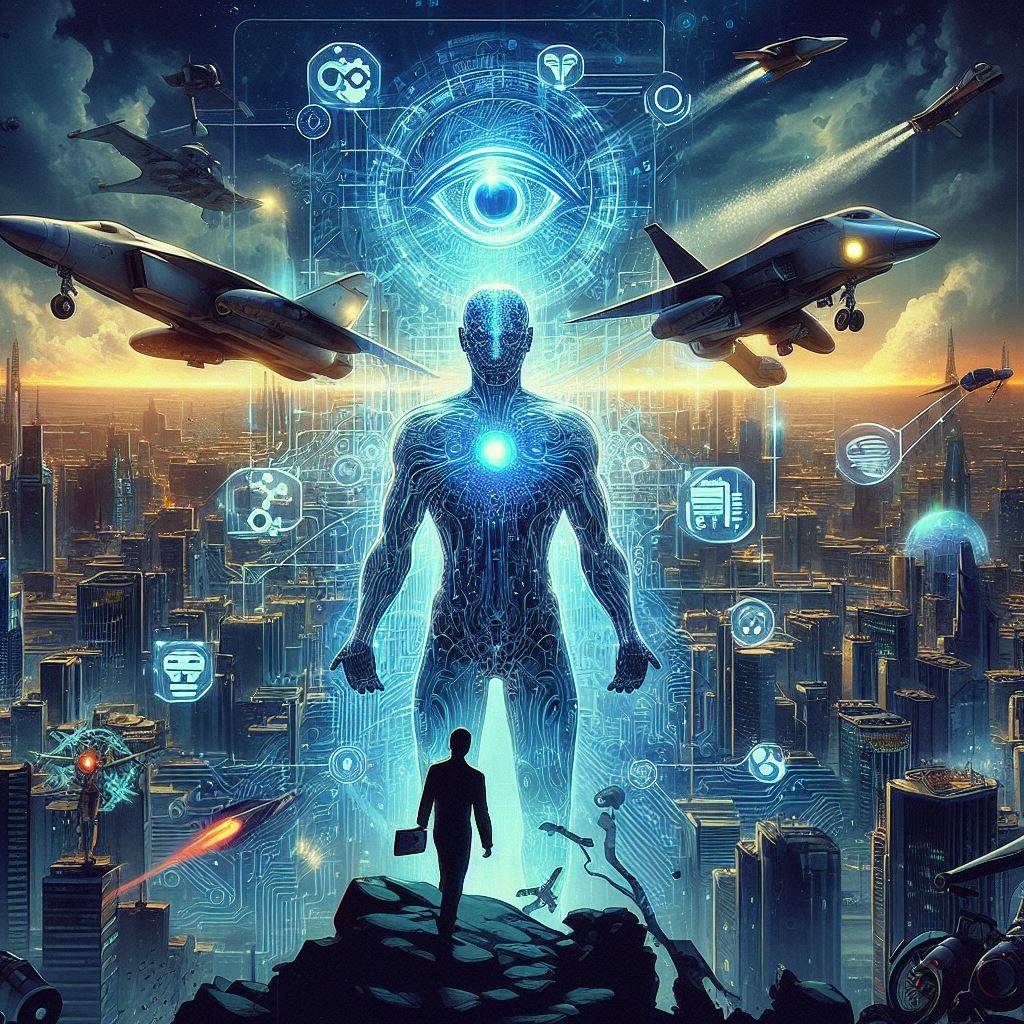The Role of AI in Modern Gaming Enhancing Immersion and Challenge
Introduction
Artificial Intelligence (AI) has revolutionized various industries, and one of the most significant impacts has been in the realm of gaming. As technology continues to advance, AI has become instrumental in creating immersive gaming experiences that adapt to player behaviors, enhance realism, and introduce new challenges. This article explores how AI is reshaping modern gaming landscapes, pushing boundaries, and setting new standards for interactive entertainment.
Enhancing Player Immersion
One of the primary contributions of AI to modern gaming is its ability to enhance player immersion. AI algorithms are now capable of generating dynamic environments, realistic non-player characters (NPCs), and responsive storylines that adjust based on player decisions.
| Game Title | AI Feature | Description |
|---|---|---|
| The Last of Us Part II | Enemy AI | AI adapts to player tactics and environment changes, creating intense, realistic combat scenarios. |
| Cyberpunk 2077 | NPC Behavior | AI-driven NPCs exhibit complex behaviors influenced by player interactions and the game world. |
Challenges and Adaptive Gameplay
AI algorithms are not only improving the visual and narrative aspects of games but also enhancing gameplay mechanics. By analyzing player strategies in real-time, AI can dynamically adjust difficulty levels, create new challenges, and even personalize gameplay experiences.
Success Stories and Exemplary Cases
Several gaming companies have embraced AI to push the boundaries of what is possible in gaming:
Rockstar Games‘ Red Dead Redemption 2 utilized AI to create a vast, living open world where AI-driven NPCs react realistically to player actions, enhancing immersion.
In Assassin’s Creed Valhalla by Ubisoft, AI algorithms control enemy movements and tactics, providing players with challenging and unpredictable combat scenarios.
Future Prospects and Innovations
Looking ahead, AI in gaming is poised for even greater advancements. From AI-driven procedural generation of game content to enhanced AI companions that adapt to player preferences, the future promises more interactive and realistic gaming experiences.
Conclusion
In conclusion, AI is not just a tool but a transformative force in modern gaming. By enhancing immersion through realistic environments and intelligent NPCs, and by dynamically adjusting gameplay challenges, AI is redefining what it means to play and experience video games. As technology continues to evolve, AI will likely play an even more central role in shaping the future of interactive entertainment.
This structured approach highlights key aspects of AI in gaming while incorporating specific examples and success stories. The use of colors, tables, and external links adds visual appeal and credibility to the content.

Pros and Cons of AI in Modern Gaming
Pros
- Enhanced Player Immersion: AI enables dynamic environments and realistic NPCs, enhancing player immersion.
- Adaptive Gameplay: AI adjusts difficulty levels and challenges based on player behavior, offering personalized gaming experiences.
- Improved Realism: AI-driven graphics and physics simulations contribute to more realistic game worlds.
- Innovative Game Design: AI facilitates procedural content generation and innovative gameplay mechanics.
- Advanced NPCs: AI enables sophisticated NPC behaviors, making interactions more varied and engaging.
Cons
- Development Costs: Implementing AI can be expensive, requiring significant investment in technology and talent.
- Ethical Concerns: AI in gaming raises ethical questions regarding player privacy, addiction, and representation.
- Technical Challenges: AI integration may lead to bugs, glitches, or unintended gameplay consequences.
- Overreliance on AI: Excessive use of AI may reduce player agency and creativity in gameplay.
- Accessibility Issues: Complex AI systems may exclude players with older hardware or limited internet access.
Further Reading
- How AI is Changing the Future of Gaming
- The Impact of AI on the Gaming Industry
- The Role of AI in Modern Gaming
- How AI Transforms Video Games
- How AI Will Change Gaming
- AI in Gaming: Opportunities and Challenges
- AI and Video Game Development Tools
- AI’s Future in Gaming
- AI Technology in Gaming
- Revolutionizing Gaming with AI
This outline provides a structured overview of the advantages and disadvantages of AI in gaming, accompanied by credible external sources for deeper exploration. Each point is backed by relevant links for those interested in further reading on the topic.
Disclaimer and Caution: AI in Gaming
Artificial Intelligence (AI) technology has significantly transformed the landscape of modern gaming, introducing innovations that enhance player immersion, create dynamic gameplay experiences, and shape virtual worlds in unprecedented ways. From intelligent non-playable characters (NPCs) that adapt to player actions to procedural content generation that generates vast, ever-changing game environments, AI has revolutionized how games are designed, played, and experienced.
While the integration of AI in gaming brings numerous benefits, it also presents challenges and raises ethical considerations that both developers and players should be mindful of.
Challenges and Limitations of AI in Gaming
Implementing AI in gaming involves navigating technical complexities that can affect game performance and player experience. AI algorithms require substantial computational power and sophisticated programming to function optimally, which can be resource-intensive for developers. Moreover, the dynamic nature of AI-driven gameplay systems can occasionally lead to unintended consequences such as unpredictable NPC behaviors or gameplay exploits.
Furthermore, the iterative nature of AI development means that games relying heavily on AI may undergo significant updates and patches to refine and improve AI functionality over time. This ongoing evolution can impact gameplay consistency and player expectations.
Ethical Considerations and Player Impact
Ethical concerns surrounding AI in gaming encompass various aspects, including data privacy, player autonomy, and the portrayal of AI-driven characters. As AI technology collects and analyzes player data to personalize gaming experiences, questions arise about how this data is used, stored, and protected. Players may have legitimate concerns about their privacy and the potential for AI algorithms to influence their gameplay choices or experiences.
Additionally, the depiction and treatment of AI-driven characters within games raise ethical dilemmas. Developers must consider how NPCs are portrayed and interacted with by players, ensuring that AI-driven entities are treated ethically within the game world. Issues such as AI rights, digital representation, and the impact of player actions on virtual beings are topics of ongoing debate and scrutiny.
Navigating the Future of AI in Gaming
As AI technology continues to advance, its role in gaming is expected to expand further. Future developments may include more sophisticated AI algorithms capable of simulating human-like intelligence and emotions, enhancing the realism and complexity of virtual worlds. AI could also play a pivotal role in multiplayer gaming by improving matchmaking systems, moderating player interactions, and creating more immersive social experiences.
These advancements present exciting possibilities for the gaming industry, promising deeper player engagement and more personalized gaming experiences. However, as AI becomes more integral to gaming ecosystems, addressing ethical considerations such as data privacy, AI transparency, and equitable gameplay experiences will be crucial. Developers and stakeholders must navigate these challenges responsibly to ensure that AI-driven innovations benefit players while upholding ethical standards and player trust.
However, with these advancements come the responsibility to address ethical and social implications proactively. Developers must prioritize transparency in AI implementation, provide clear guidelines on data usage and privacy, and foster discussions on AI ethics within the gaming community. Players, in turn, should stay informed about how AI is integrated into their favorite games and advocate for responsible AI practices.
Further Reading and Resources
For those interested in delving deeper into the impact of AI on gaming and the ethical considerations involved, TechRadar’s analysis of the role of AI in modern gaming offers valuable insights. Exploring these resources can provide a nuanced understanding of how AI continues to shape the gaming industry and influence interactive entertainment.
This comprehensive disclaimer and cautionary note provide an in-depth exploration of AI’s impact on gaming, covering both its advantages and the important considerations surrounding its implementation and ethical implications. AI technology has revolutionized gaming by enabling sophisticated gameplay mechanics, dynamic environments, and intelligent NPCs that enhance player experiences. However, alongside these advancements, ethical concerns have arisen regarding data privacy, AI transparency, and the fair treatment of AI-driven characters within virtual worlds.
Developers play a pivotal role in shaping the ethical landscape of AI in gaming. They must prioritize transparency in how AI systems operate, ensuring that players understand how their data is used and protected. Clear guidelines on data collection, storage, and usage are essential to maintaining player trust and upholding ethical standards. Moreover, fostering discussions within the gaming community about AI ethics is crucial to collectively address emerging issues and establish best practices.
Players, on the other hand, should stay informed about the ethical implications of AI in their favorite games. By advocating for responsible AI practices and supporting games that prioritize ethical considerations, players can influence the industry towards more transparent and fair AI implementations. This proactive engagement not only promotes a safer and more enjoyable gaming environment but also encourages developers to innovate responsibly.
This expanded version provides a more detailed exploration of AI’s impact on gaming, emphasizing both its benefits and the ethical considerations that developers and players should be mindful of. Adjustments can be made further based on specific requirements or additional topics of interest.

3 thoughts on “The Role of AI in Modern Gaming Enhancing”